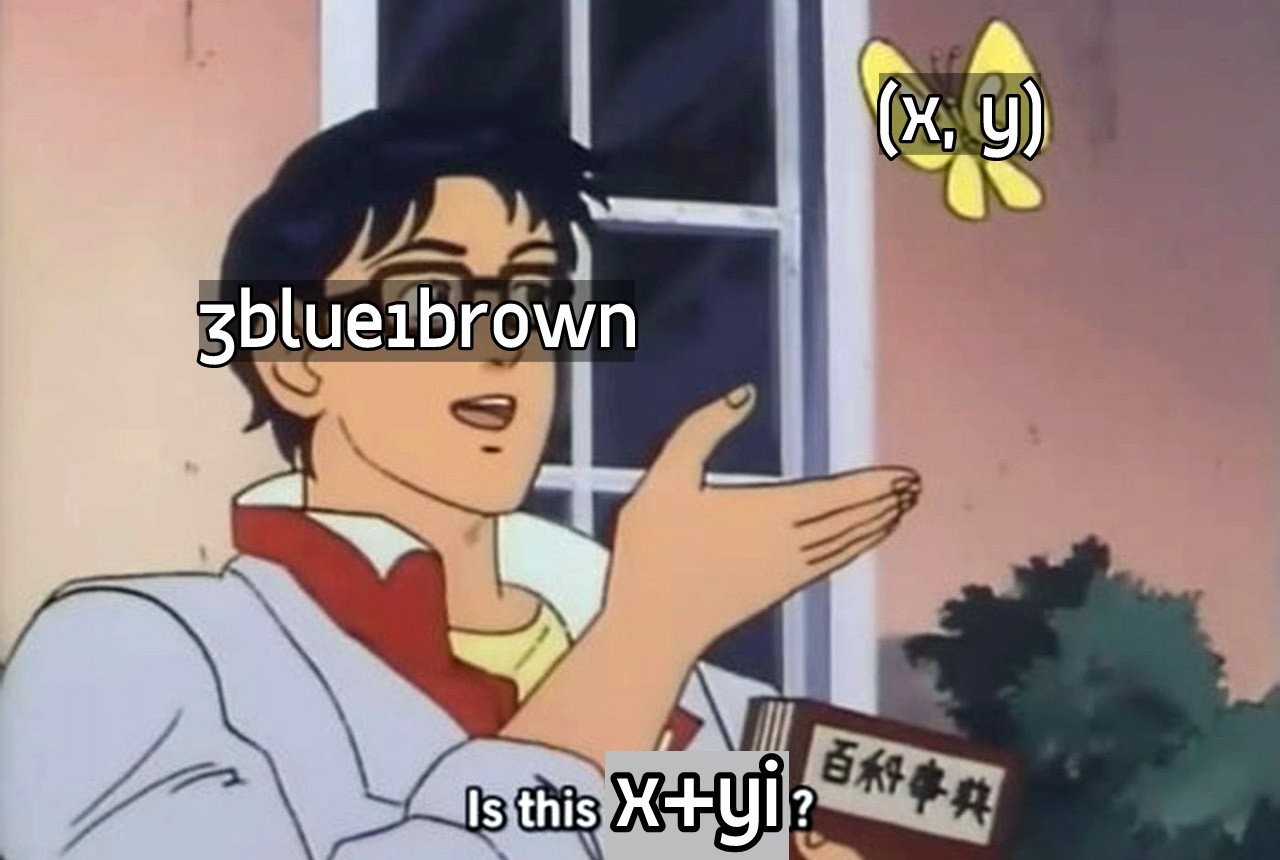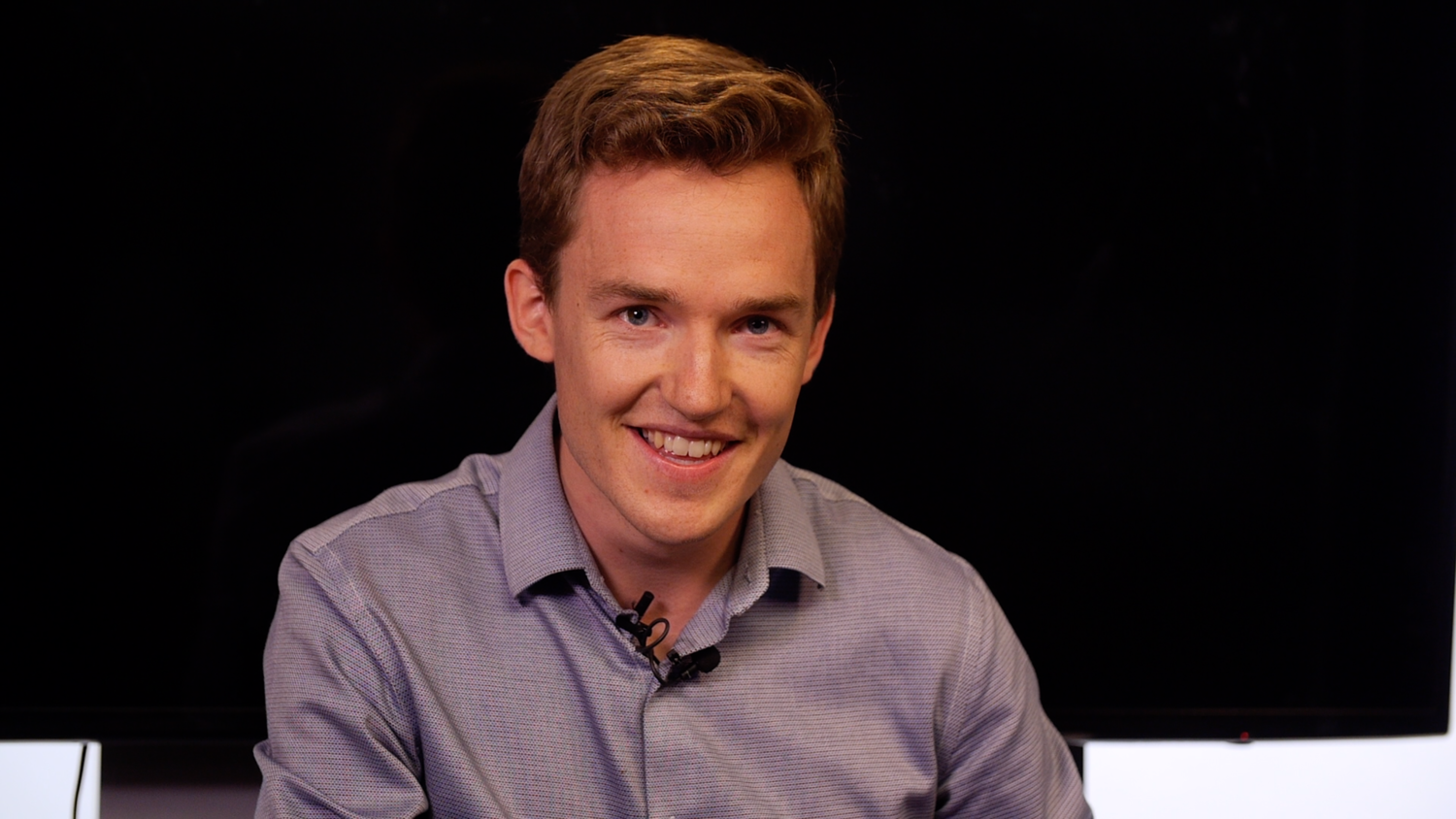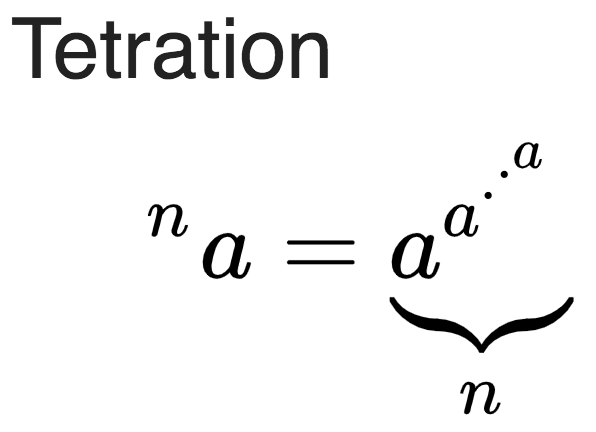You know you’ve made it when you’ve got your own subreddit. In Grant Sanderson’s case, he corrected me that he had two. One for his visual, explanatory math YouTube channel 3Blue1Brown, which has 1.5 million subscribers as of writing. One for his mathematical animation engine Python package Manim.
“The first subreddit is so helpful. The first link on that subreddit is for content requests. People can vote on the topics they like. It exists so that people can see just how incredibly many requests there are. If everyone sent me their request my inbox would be swamped and it’s unlikely I’d ever get to it.”
Grant also enjoys the memes. The one he recently shared on his Twitter makes fun of his obsession with complex numbers. During our coffee, he managed to slip in the phrase “complex number” and I made the mistake of saying I’ve never used complex numbers in my life. “That,” Grant was triggered, “I can give you a lecture on.”

But Grant had mixed feelings about the second subreddit. “I didn’t dislike it, but I was worried that it would encourage more people to use Manim. Do I want that? Hmm. I wrote the package for myself. It has never been tested.”
“It must suck having everyone fall in love with what you create.”
“Sorry,” he blushed. “I realize it sounds like humblebrag.”
**
I first came across his channel last year when a friend insisted that “there is this amazing video on Fourier transform” I had to watch. (I don’t know why I have that kind of friends). Another friend, during one of geeking out sessions on YouTube, said that he used to jam with Grant in college. Then Grant just sorta passed into the sphere of people I’d love to meet but probably won’t, until I started StanfordIRL and thought his story would be an inspiration to people looking beyond traditional career paths after college.
I have a few friends who know Grant and offered to introduce us, but I wanted to try cold-emailing him. Later on, he told me that he didn’t always respond to emails from random strangers but he saw that I mentioned Stanford: “She’s one of my people.” He looks back fondly of his freshman year at FroSoCo, a dorm with the reputation for spawning and hosting incorrigible nerds. “I had no idea what FroSoCo meant. When doing the questionnaire, I saw the question: ‘If you chose FroSoCo, please explain why’ and I thought: ‘Wait, this is the only dorm that requires an essay’ so I went back and chose FroSoCo. Looking back, it was perfect for me. There was a disproportionate amount of international and transfer students. I have so much admiration for them. Their path to Stanford is usually not that linear.”
We met at a coffee shop downtown Palo Alto. He had driven down to hang out with a friend in town and run experiments for his next video. “It’s the third video in this collision series. The first one shows that the number of collisions of two objects converge to what looks like pi. The second explains why. I’ve been obsessed with it. Instead of counting collisions, I want to count the number of times the light from a laser reflects back and forth between two mirrors. But I learned this afternoon that it’s not easy to record the movements of a laser light. The experiments were kind of a wreck, really. To show how the light is reflected, I’d have to keep it stationery and reflect the entire world.”
“Uh, nice to meet you,” I said and mentally adjusted my pre-weekend brain to the intensitivity of the conversation that was to come. What did I expect from the guy who makes videos about topology and quaternions for fun?

In his videos, Grant speaks in a slow, almost trance-like voice. But it isn’t innate. When he started his channel in 2015, he spoke like a “firehose” of information, a style popular among Internet videos at that time. Then he read the comments and realized that it isn’t suitable for math.
Away from his studio, he can still be that firehose when he’s excited. And he’s excited about math. His whole life revolves around math. When asked how much of his time is spent working on 3Blue1Brown, he was confused.
“I don’t know. Say I read a math book to look for ideas, is it work? Or when I hang out with other YouTubers. I’m not doing a video with them right then but I might in the future.”
“Let me rephrase it. How much of your waking hours is spent doing things you feel like you have to get done for the channel?”
“30%.”
**
When I learned that 3Blue1Brown referred to his eye color – three-quartered blue and one-quartered brown – I thought that it was a bit too personal. So I asked some of our mutual friends: “Is Grant self-absorbed?” “Not that I’ve noticed. Why?” He just wants the world to see math through his eyes.
But Grant doesn’t want the whole world to do math. He’s wary of people who tell him they want to major in Math after watching his videos. In an interview with Numberphile, he said: “I don’t think everybody should major in Math. It should be there as an elective, but shouldn’t be mandatory. If I had to tell somebody what to study, I’d tell them to study something like Computer Science. And that person should certainly not listen to advice from somebody on the Internet.”
Keeping it real, he’s aware of his selfish reason to make videos on topics that interest him. “When we’re passionate about something, we want other people to also be passionate about it. It validates ourselves. We don’t care if our passion is good for other people. We just want them to confirm that our passion is the best thing in the world.”
He spends a lot of time thinking about who he is and why he does what he does. Our conversation fluctuates between mathematical and philosophical. When I asked him “How would you describe yourself?”, Grant went down the rabbit hole.
“I always have that problem whenever I fill out a government form and it asks about my occupation. Sometimes I put ‘writer’ as all the videos I make are actually storytelling. Sometimes I put ‘animator’.”
“Not educator?”
“No. I explain, not educate. Are you familiar with the etymology of the word ‘education’? Don’t quote me on this but I think it means to ‘bring out’ things that already exist within someone, as opposed to just throwing facts at them. It’s a shame that ‘education’ nowadays no longer has that meaning.”
“How about YouTuber?”
“That would be the most accurate description, but that word also has a certain connotation that I don’t think suits me. When people think of YouTube, they think of entertaining things like cat videos.”
Just like he had denied being an educator, he denied being a mathematician. “Maybe I’d hang out with mathematicians more if I were one.” He has never done math research, except for a brief summer working as a research assistant for a math professor. “A Math PhD is not off the table but it’s not in the near future, at least not for the next five years. I think I’ll be a good mathematician, but I won’t be great. “ And Grant wants to be great. “You can be a great math storyteller,” I said. He warmed up to the idea: “I like it. Math storyteller.”
**
Grant is as in love with storytelling as he is with math, as if it, too, was an underlying truth of the universe. “Everyone can benefit from being a better storyteller. Facts are better grasped when they are presented as stories.” He believes that one of the reasons why there aren’t more people into math is because math textbooks are incomprehensible. “If you pick up a math textbook, it probably opens with a glossary. You don’t teach kids English by giving them a dictionary. It’s just dense. Nobody wants to read it.”
When I asked him what books he was reading, I had expected some books with clever mathy titles.
“It’s funny. I’m reading two books. One is about writing, Stein on Writing. The other is about reading, How to read a book, a delightful read.”
“Have you published any of your writing?”
“Sadly, no. Procrastination, I guess. I’ve been thinking about a math coffee table book, a pretty book with sketches of elegant proofs and beautiful concepts. A lot of people don’t think of math because they never come across it. But if you sit down and see a math book that isn’t intimidating, you might think about math more.”
“I’m so going to buy that. How far are you into the project?”
“Not far. I’ve done some sketches but that’s about it. What makes you excited about it?”
“I love bringing together seemingly contradictory ideas. You know Hamilton is such a great musical because it combines hip-hop with history. Math and coffee table book. Can’t say I’ve seen that combination before.”
“Cool,” Grant couldn’t hide his smile. “I’ll have to work on some more sketches tonight.”
“Do you want me to keep you accountable? How about in five years, I’ll knock on your door and ask: ‘Hey where’s my book?’“
“Yes please. Five years is good, but I hope it’ll be out sooner than that.”
**
When a mutual friend knew that I was going to meet Grant, he told me to ask Grant about his long-term plan. Fresh out of college, most people stay at a job for 2 or 3 years, long enough for them to feel like their learning curve has plateaued. Grant has been working on his channel for more than 3 years. Has he ever felt like he needs a change?
“I guess I’m not ambitious that way. I love what I’m doing and I don’t see why I should stop. I feel like my journey with 3Blue1Brown has just started. I have a story for this. I once met the guy who runs Kurzgesagt. Yeah it’s hard to pronounce. It means ‘in the nutshell’ in German. Anyway, I met him at a conference and he told me that he’d won YouTube and didn’t know what to do next. So I launched into this rant. What do you mean you don’t know what to do next. It’s just the beginning. You have all this power now. You can do anything.”
Living outside the corporate world, Grant seems to have managed to escape the narrative of “what’s next” and “searching for the next big thing” so pervasive in Silicon Valley. He doesn’t have deadlines, except for the occasional promises he makes with his audience. He doesn’t concern himself with the question of operation, finance, or scalability. While he collaborates with other YouTubers, his channel remains a lone person project.
He still tutors three kids he has been tutoring since he was in college. “There’s no money involved. I give them my service in exchange for being extremely unreliable. I might not show up for weeks. That reminds me, I need to find new students because the oldest one is a senior in college now. What do I get out of this? I’ve been with them for so long they are like cousins. It’s also helpful to see how humans learn.”
He takes time to travel. “I just came back from South America. A conference on technologies for education in Uruguay invited me to give a talk and I thought I could use the opportunity to see that part of the world. I took my mom with me. I had promised to travel with her. I took me 11 months to make it happen, but it could be worse.”
Grant lives a freedom that everyone claims to live towards, until high-paying jobs and a false sense of security snatch them away.
**
“I’m very lucky that my parents have always been supportive of whatever I do. When I was considering leaving Khan Academy to focus on my own channel – it had about 60,000 subscribers at that time, not a trivial amount but not that huge either – my dad told me to give that YouTube thing a try. I was like: ‘Why?’ He told me he was curious to see how that’d turn out. So yes, I was his experiment. And I was like: ‘Thanks dad.’ My mom is laissez-faire but since she grew up poor – she migrated from Ireland and her father passed away when she was a kid – she wants security. When I got returning offers from internships in college, she always told me: ‘You should take it.’”
“When did her perception of that YouTube thing change?”
“I actually don’t know. I guess it was a process.”
“Maybe a moment like when you hit a million subscribers?”
“Let’s stick with that. A million subscribers definitely help.”
“How much do you care about statistics like subscribers and views?”
“I wish I could say that I don’t, but I do. Especially when a video is popular, I keep looking at the real time statistics. It’s addictive. Let me show you. Here, at the corner is the number of minutes people have spent watching my videos in the last 28 days. This number doesn’t mean anything so I’ve worked out a conversion for a more meaningful metric. 1 million minutes in 28 days means that at any given moment, there are about 25 people watching my videos. So 28 million means that in the last month, at any given moment, there are 700 people watching my videos.”
“Hey that could a be a cool feature request for YouTube.”
“Please no,” Grant winced. “I don’t want another number to obsess over.”
**
Just like numbers, his life is arranged neatly onto a coordinate system. He moves among a small, close-knit social circle, one in which everyone is there for a reason. “I’m really close with my brother, who also graduated from Stanford in 2012. His friends have become my friends. You can call them the Stanford crowd. There are friends I know from Khan Academy, and then there are friends who make YouTube videos. I’ve always been introverted to begin with, and as you get older, your social circle becomes smaller.” When I mentioned one of our mutual friends, Grant’s eyes lit up. “He’s such a great person. I love him. I really do. He made me so happy.” But Grant hasn’t seen that friend for a few years and doesn’t feel the urge to. “We just aren’t that kind of friends.”
On YouTube, he’s blissfully unaware of anything that isn’t education related. He doesn’t know what PewDiePie does. He knows that gaming and beauty are huge, but he has never watched any of those videos. He surrounds himself with people who love science and learns from them.
“Do you know Vsauce? He’s all about content. When you go to YouTube creator conferences, the conversations eventually drift to the topic of sponsorships. Michael [the creator of Vsauce] is never part of that. He just talks physics all the time. He’s my role model in that way, but I don’t think if I was to emulate him I’d be able to publish anything. He thinks that every work must be a magnum opus, every video must be better than the last. And if you haven’t published a video for a while, the next video must be really amazing to be worth the wait. It just adds to the pressure. Or Mark Rober. Yep, he’s the glitter bomb guy. He just has this incredible sense of social awareness and creates videos that go viral. I don’t have that kind of social awareness. Maybe because I live in my own world. I just pursue topics that interest me.”
**
We planned for a 45 minute chat but I ended up running an hour late for dinner. We’d gone onto the topic of tetration and Grant was determined to show me the magic of it. Tetration is a recursive exponential operation in which tetration(a, 1) is just a; tetration(a, 2) is when you raise a to the power of a; tetration(a, 3) is when you raise a to the power of tetration(a, 2) and so on. Written in its mathematical notation, tetration looks like a tower.

“Consider 2. With 2 layers, it’s 4. With 3 layers, it’s 16. With 4 layers, it’s 65,536. Still manageable, right? Then with 5 layers, it’s 2 to the power of 65,536. More than the number of atoms in the universe. We can’t even grasp how big it is. But if instead of using 2, we start with 1.01. No matter how many layers there are, the value will never exceed 10. There’s a finite upper-bound on the tetration with base 1.01. Don’t believe me? Let me show you. My question is between 1.01 and 2, at which point does it change from having a finite upper-bound to going to infinity?”
As Grant took out his laptop and typed furiously onto his Terminal, I was momentarily swept away by his enthusiasm and saw the beauty of math the way he does. Then the more practical side of me arose and I couldn’t help but asking the question:
“What’s its application in real life?”
“Hmm,” he stopped typing and gazed into the distance. A black party bus had just parked across from us to pick up young, incorrigibly nerdy twentysomethings of Silicon Valley for a weekend debauchery in Napa Valley. Looking into his three-quartered blue, one-quartered brown eye, I realized how stupid my question was. To Grant, math is real life.
**
Three people Grant would like to see featured next on StanfordIRL: